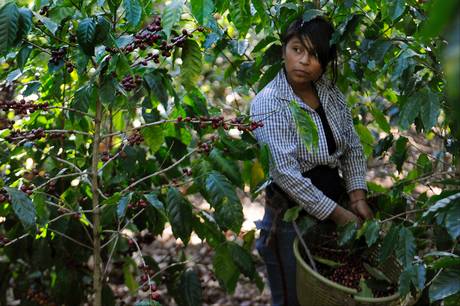China has celebrated International Workers' Day since 1920, when Communist Party founders held rallies with student and labour unions in Shanghai and Beijing.
The day was officially declared a public holiday in 1949, and during the Cultural Revolution it was one of the most important holidays in the country.
It is now celebrated over a three-day weekend.
The country may have embraced the holiday, but the spirit of the day seems to be a bit lost on its government. Chinese workers do not have basic rights such as freedom of association and the right to collective bargaining (both pretty key foundations of most labour movements).
Guatemala
According to the International Trade Union Confederation (ITUC), Guatemala is “one of the worst places to be a worker, with no guarantee of rights”.
The country was awarded a rating of ‘5’ by the ITUC in its 2014 Global Rights Index, which rated countries from 1 to 5+ according to how well they protect workers’ rights.

A woman picks coffee beans (Getty)
According to the Index, “countries with a rating of 5 are the worst countries in the world for workers to work in.
“Workers have effectively no rights and are therefore exposed to autocratic regimes and unfair and abusive practices.”
In June last year, the ITUC also said that Guatemala was the most dangerous country in the world for the exercise of trade union activities.
As of 2014, they estimate that at least 73 trade unionists have been killed in the country since 2007.
Cambodia
Cambodian garment workers standing on a truck as they travel along a street in Phnom Penh (Getty)
Like Guatemala, Cambodia also gained a ‘5’ rating from the ITUC’s index of the world’s worst places to be a worker.
The Cambodian garment sector is particularly notorious for especially poor labour rights and working conditions.
A report published by Human Rights Watch last month highlighted the lax government enforcement of labour laws and widespread nature of rights abuses.
The report said that “the Cambodian government is failing to protect garment workers who are producing for international apparel brands from serious labor rights abuses.”
These included unlawful child labour, intimidation of union leaders, failure to provide reasonable accommodation for pregnant workers, and avoidance of paying workers maternity and other benefits in order to control them.
Pakistan
In September 2012, a fire tore through a Karachi garment factory. It killed 298 people, making it the largest number of casualties in a single industrial incident in the history of Pakistan.
Relatives mourn the death of a loved one during a funeral for a garment factory victim in Karachi (Getty)
In the aftermath, workers were said to have been unable to escape because the doors were locked to prevent them from leaving their shifts early. Workers also had to smash iron bars on the windows to jump out of the building, all whilst engulfed in the flames of toxic smoke caused by unsafe chemicals in the factory.
Human rights groups say that the country’s labour laws suffer from sweeping abuse by employers who act with impunity. Rights groups also point out that child labour is widespread, including bonded child labour and trafficking.